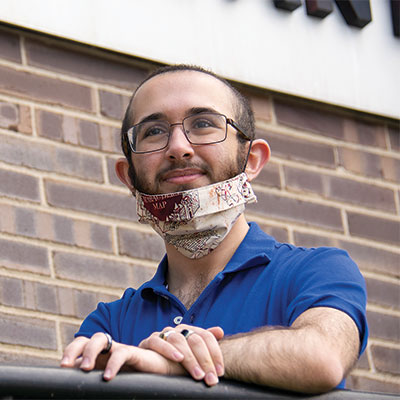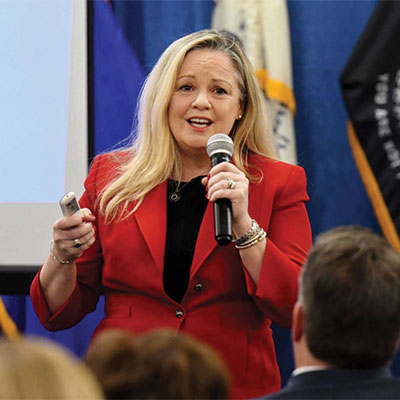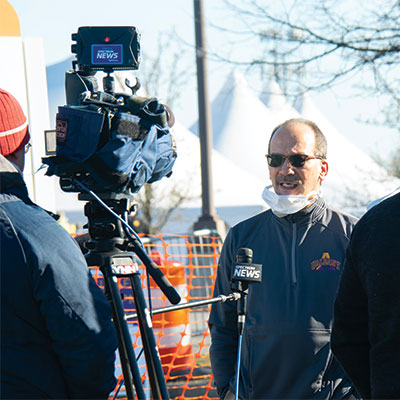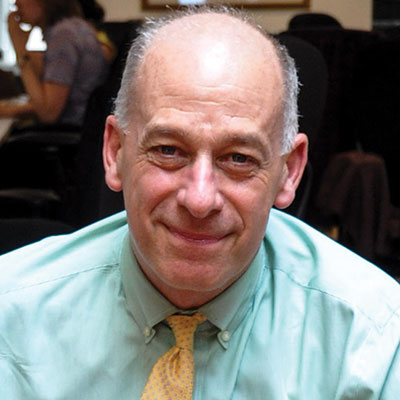the Contact Tracer

On April 29, 2020, nearly 5,000 people in New York State tested positive for the COVID-19 virus. At a press conference the next day, Gov. Andrew Cuomo described the enormous response needed to halt the spread of the disease: “It will require, under any estimate, a tracing army.”
Monroe Marshall ’20, a School of Public Health graduate, was a “soldier” in that army.
As a volunteer case investigator at the Albany County Department of Health, Marshall’s responsibilities included contact tracing, what the Centers for Disease Control and Prevention calls a “core disease control measure” needed to battle highly infectious diseases like COVID-19. After a person tests positive for the virus, labs notify local health departments, and the contact tracers are mobilized. Their mission: Identify and alert all of the people who came into close contact [within a 6-foot distance for longer than 10 minutes] with the infected person in the 14 days prior to the onset of symptoms in that individual. It is a critical task, because individuals who are infected, but don’t know it, can infect others and the infection rate multiplies. For contact tracers, it’s a race against time.
For Marshall, Brooklyn-born and Long Island-raised, it was an opportunity he had long awaited. “I had known I was interested in epidemics since middle school, when I was the only student who appeared to be ‘obsessed’ with H1N1,” he said, referring to the 2009 novel influenza virus that was first detected in the U.S. and spread globally. That obsession eventually led him to study epidemiology at UAlbany’s School of Public Health.
In the fall of 2018, at the urging of a classmate, Marshall registered for the Albany County Medical Reserve Corps, a trained group of medical professionals and volunteers deployed to assist the county in a public-health emergency. However, it wasn’t until more than a year later, on March 17, 2020, that Marshall would be called into action. The next day, he reported to the Albany County DOH, which is led by SPH alumna Elizabeth Whalen, MD, MPH ’12 [see her first-person piece on page 20]. The work was challenging and sobering: seemingly endless phone calls notifying individuals of their exposure and/or enrolling them in mandatory quarantine. Often, the reality of the life-and-death stakes hit home for Marshall. He noted, in an interview last May while he was still actively working cases, that the job wasn’t all gloom and doom, however.
“The most rewarding parts of this work are the wholesome phone calls I have with individuals... who appreciate us checking in on them and helping them be safe. Sometimes, I have amazing conversations, and we end up laughing.”
Still, Marshall, who is gentle and approachable, wrestles with the paradox that a terrible tragedy has provided him a once-in-a-lifetime opportunity. “I am ‘appreciative’ of all of the opportunities I have, but then I also think, ‘This is a crisis, and people are sick and dying. Many lost their jobs and even their homes,’ and I feel bad,” he says of the public-health emergency.
Yet, the experience has only inspired the recent graduate to pursue the passion born in a middle-school classroom so many years before. “Now, having actually experienced doing the work of a county epidemiologist, I am applying to a wide range of positions in multiple cities (including many here in Albany!) that range from epidemiologist to community-health worker to clinical researcher,” says Marshall – now a battle-tested “soldier” ready for his next fight.




